Locking your trailer to your truck is essential to keep your cargo safe and secure during transportation. A properly secured trailer will not only prevent theft but also ensure that your load doesn’t shift or fall during transit.
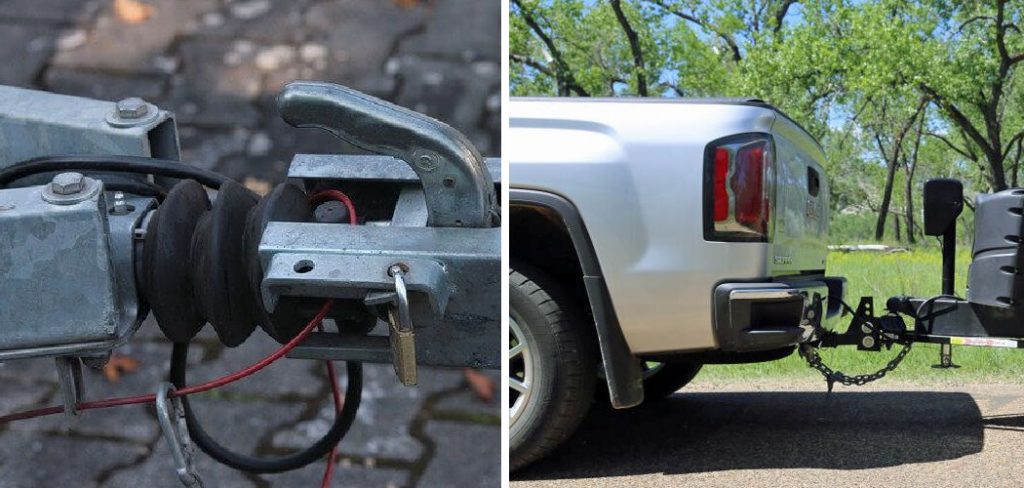
In this post on how to lock a trailer to a truck, we’ll take you through step-by-step guidelines on how to lock your trailer to your truck, including best practices to make sure you’re doing it right.
What is Trailer Lock?
A trailer lock is a device used to secure the connection between a truck and its trailer. Typically, it contains an adjustable arm or strap attached to both the vehicle and trailer that can be tightened to secure the two together. It also generally contains a locking mechanism that prevents any unwanted tampering with the connection.
Why is Locking Your Trailer Necessary?
Locking your trailer to your truck is an essential safety measure. An improperly secured trailer can become a hazard on the road due to the risk of shifting or falling cargo, which in addition to potentially damaging goods, can also cause accidents and injury.
When locked properly, however, the connection between the vehicle and trailer is secure and unshakable, ensuring that your cargo is firmly held in place at all times.
Needed Materials
To securely lock your trailer to your truck you will need:
- Trailer Hitch Locking Pin or Coupler Lock
- Heavy-duty Padlock (Optional)
- Safety Chains (Optional)
11 Step-by-step Guidelines on How to Lock a Trailer to a Truck
Step 1: Make Sure You Have the Right Lock
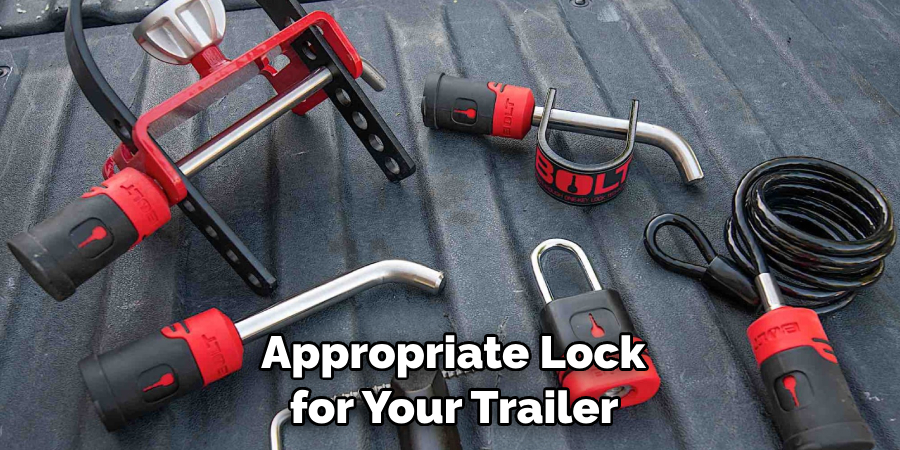
The first thing you need to do is ensure that you have the appropriate lock for your trailer. There are various types of trailer locks available, but some locks may not be compatible with your trailer’s design or size. Therefore, it’s essential to choose a lock that is appropriate for your trailer to secure it correctly. A good quality lock is a vital tool for keeping your trailer safe and secure.
Step 2: Check the Trailer Hitch
Before locking your trailer, check if your trailer hitch is securely fastened to your truck’s hitch. Ensure that the hitch ball size of your truck matches the coupler size of your trailer. If you have the wrong size, it could lead to damage to your trailer and cause an accident. But if it’s the right size, then you can be sure that you can safely lock your trailer to the truck.
Step 3: Place the Coupler on the Hitch Ball
The next step is to place the coupler on the hitch ball. Make sure the coupler is positioned correctly and that it’s fully seated on the hitch ball. You can verify this by lifting the trailer tongue off the hitch ball and checking if it falls back into place. But if it doesn’t, you may need to adjust the coupler and re-position it. This is important because if you fail to do this, your trailer may be insecurely attached to the truck
Step 4: Adjust the Height of the Trailer
If your trailer is not level, adjust the height of the trailer hitch by raising or lowering it. If the trailer hitch is not level, it could cause damage to your trailer’s tires or suspension. You can adjust the height by turning the bolts or adjusting screws at the top of your trailer hitch. However, ensure that your trailer is still level after adjusting the height. Otherwise, it can severely affect your truck’s handling.
Step 5: Insert the Locking Pin
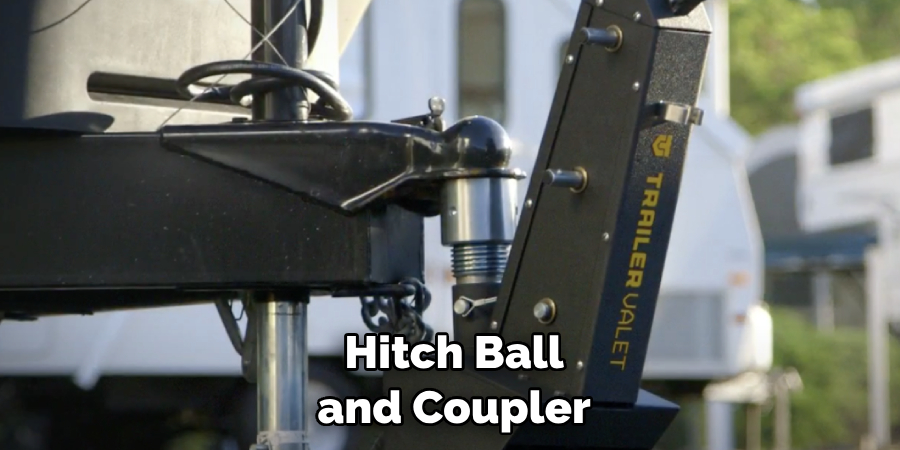
Insert the locking pin through the hole in the hitch ball and coupler. Your trailer hitch may have a hole that matches the size of the lock you have for the trailer. This will allow you to quickly install the lock. It is important to make sure that the pin is set correctly and tight enough to properly secure your trailer. Otherwise, it may be easy for thieves to force the lock open or disconnect the trailer.
Step 6: Tighten the Coupler
You need to tighten the coupler’s nut on the trailer hitch to keep the hitching mechanism secure. Keep tightening the nut until you can no longer move it by hand. It’s important to make sure that it’s tightly secured, otherwise, it may become loose while you’re driving and cause the trailer to detach from the truck.
Step 7: Inspect your Trailers Safety Chains
Ensure that your trailer’s safety chains are attached properly. Always verify this by crossing the chains under the tongue of the trailer. This will ensure that the trailer tongue is supported if it becomes detached from the hitch. You should also check that the chains are in good condition and not frayed or broken. It’s important to inspect the chains regularly as they can become worn out over time.
Step 8: Secure the Trailer Connector
Connect the trailer wiring harness to the truck. Ensure that it is tightly and securely connected, as it will provide the necessary power to your trailer’s brake and light systems. Although it is not necessary to lock the wiring harness, it is a good practice to do so in order to prevent tampering with your trailer’s electrical system. It is also important to check that the wiring harness is compatible with the trailer’s electrical system.
Step 9: Attach the Lock to the Coupler
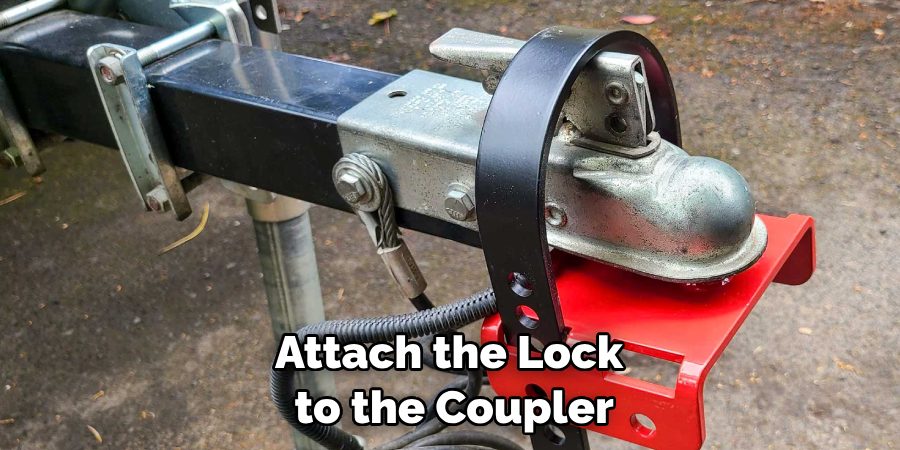
Attach the lock to the coupler. Ensure that the lock is tight enough so that it secures the coupler in place. The tighter the lock, the more secure your trailer will be when traveling.
Whether you choose to use a padlock or a trailer hitch locking pin, it is important to make sure that the lock is properly attached and secure. It is also important to note that if you choose to use a padlock, make sure it is of good quality so it isn’t easily broken or picked.
Step 10: Secure the Lock
Make sure the lock key is not left in the lock once you secure the trailer. Keeping your lock key inside the truck will prevent anyone from stealing your load or damaging your trailer or your lock. It is also important to remember that locks can be broken or picked, so it’s essential to keep the key in a place where no one has access to it. You should also consider using a heavy-duty padlock to reinforce the security of your trailer.
Step 11: Test Your Trailer & Lock
Before moving, double-check that your trailer and lock are secure and in good working condition. Give your trailer a quick tug to check if it’s connected well, and verify that your lock is not loose. But if it is, you should adjust the coupler and retighten the lock. Doing this will ensure that your trailer is securely attached to your truck when driving and help keep it safe from theft or damage.
Following these simple steps on how to lock trailer to truck will help you securely lock your trailer to your truck. Always remember that a properly secured trailer is essential for safe and secure transportation of goods, so make sure to double-check your locks before embarking on any journey.
Frequently Asked Questions
Q1: Do I Need a Lock for My Trailer?
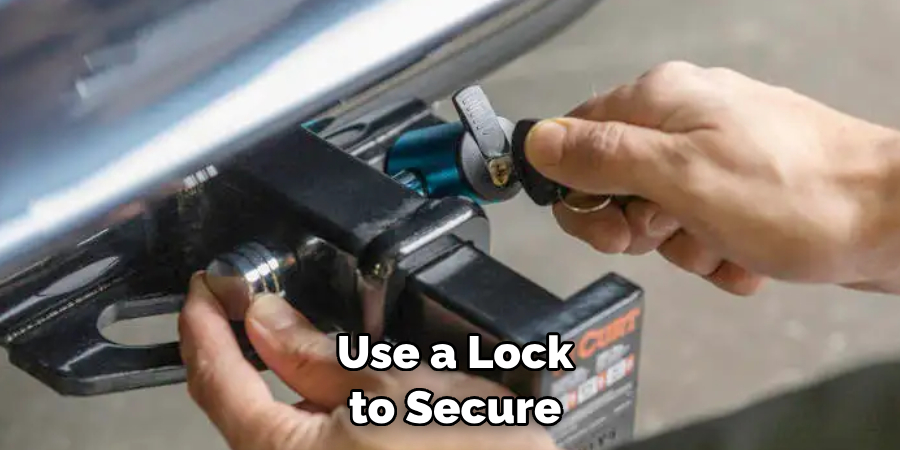
A1: Yes, it’s important to use a lock to secure your trailer to your truck. This will ensure that your trailer is secure and won’t come loose during transit. It also prevents theft of your cargo and trailer.
Q2: How Often Should I Check That My Trailer Lock Is Secure?
A2: It’s recommended that you check the security of your trailer lock at least once a month, or before each trip. This will help ensure that it remains secure and your load does not become an accident hazard due to an improperly secured trailer.
Q3: How Do I Know What Size Lock to Get for My Trailer?
A3: The size of the lock you need depends on the size and design of your trailer. You can check with the manufacturer or your local dealer to determine the correct size lock for your trailer.
Q4: Are There Any Other Tips I Should Keep in Mind When Locking My Trailer?
A4: Yes, always make sure your trailer hitch is securely fastened to the truck’s hitch and that the height of the trailer is correctly adjusted. Additionally, check for any loose or damaged parts on your trailer before locking it.
Conclusion
Locking your trailer in your truck is an essential step to keep your cargo safe. Following the above-discussed guidelines will ensure that your trailer is locked correctly and will stay that way throughout your journey. When you follow these steps on how to lock trailer to truck, it will give you peace of mind knowing that your cargo is secure, and you can focus on driving safely.
About
Safety Fic is a distinguished figure in the world of Diy design, with a decade of expertise creating innovative and sustainable Diy solutions. His professional focus lies in merging traditional craftsmanship with modern manufacturing techniques, fostering designs that are both practical and environmentally conscious. As the author of diy, Safety Fic delves into the art and science of Safety Fic-making, inspiring artisans and industry professionals alike.
Education RMIT University
(Melbourne, Australia) Associate Degree in Design (Safety Fic) Focus on sustainable design, industry-driven projects, and practical craftsmanship. Gained hands-on experience with traditional and digital manufacturing tools, such as CAD and CNC software.
Nottingham Trent University
(United Kingdom) Bachelor’s in diyfastly.com and Product Design (Honors) Specialized in product design with a focus on blending creativity with production techniques. Participated in industry projects, working with companies like John Lewis and Vitsoe to gain real-world insights.
Publications and Impact
In diy, Safety Fic his insights on indoor design processes, materials, and strategies for efficient production. His writing bridges the gap between artisan knowledge and modern industry needs, making it a must-read for both budding designers and seasoned professionals.
